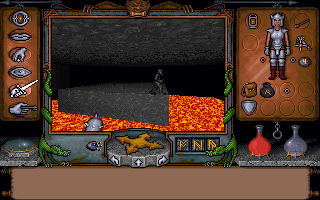I’ve been a big fan of the Ultima series for a long time. The only thing that’s kept me from talking about it up until now is the knowledge that quite a lot of metaphorical ink has been spilled about it already. With that in mind, I’m going to talk about a slightly more obscure entry in the series: Ultima Underworld: The Stygian Abyss.
Ultima Underworld takes the player through an eight-level dungeon crawl, exploring the remnants of a utopian colony established in the Great Stygian Abyss. There’s a lot of lore from the series integrated into this game, despite the fact that it was only turned into an Ultima game midway into production. Conspicuously absent from the game, though, is the sort of conscious investigation of moral and ethical systems which marks the primary games in the series. Unlike, say, Ultima V, which meditates on the foolishness of attempting to coerce virtuous behavior, UU never really digs in and makes a statement about why Sir Cabirus’s colony of virtue fails. Is it because devoting the colony to all eight virtues was too much to ask of the inhabitants? Or because he attempted to incorporate too many diverse cultures/species into the colony, resulting in a failure to form a cohesive community? Or even because the Abyss itself has a corrupting influence? These are ultimately tangential concerns, as while you may be picking your way through the ruins of Cabirus’s dream, your primary concern is rescuing a damsel and preventing a mad wizard from unleashing a demon.
From a gameplay standpoint, Ultima Underworld is notable as one of the first 3D first-person role-playing games. The game’s atmosphere of exploration and claustrophobia is excellent, with dark corridors snaking everywhere. Aside from the seventh level, which uses some ham-handed means to force you to progress down a certain path for story reasons, the game is pretty open, and allows you to take your pick of means of exploration. You can painstakingly explore every inch of every level, or haphazardly dive deeper and deeper, or even swim through the waterways to see where they lead. A certain degree of backtracking back and forth is required, as some necessary plot items can only be retrieved after learning about them on deeper levels, and some areas can only be accessed from above or below. There are some sidequests in the game, but these take a backseat to simple exploration.
Along with the 3D engine, the game’s skill system is a pretty clear inspiration for later games such as System Shock and Deus Ex. Those later games would end up replicating some of the perennial flaws in evidence in UU. Basically, the game gives you access to too many skills, too many of which aren’t particularly useful compared to other skills which are absolutely necessary. You’ve got to build up your basic combat skills in order to survive, and magic is so mind-bogglingly useful that you’d be foolish to ignore it; once you get past those, you don’t many training opportunities left and the remaining skills aren’t that useful anyway. Picklock, Lore, and Swimming are potentially useful, but easily replaced by spells. Repair is replaced by a convenient smith that you can just pay to mend your equipment. Acrobat and Search are only needed in small quantities, and Traps, Tracking, Charm, and Appraise are flat out worthless. Even if you were trying to roleplay a self-sufficient magic-averse character, you’re looking at taking the skills you’d spend on the two magic skills (Mana and Casting) and spreading them out over half a dozen mildly useful alternatives. The twin bugbears of too broadly effective magic and poor implementation of non-combat skills that plague so many RPGs are in full effect here.
On the one hand, there isn’t enough variance in Ultima Underworld‘s narrative or in the character options to give it much in the way of replay value. On the other hand, exploring the Abyss is fun enough in its own right, that I often return to the game anyway once my memories of the dungeons have dimmed. Add the sequel to that, which is much the same in terms of gameplay and narrative variance, and I at least get some enjoyable hours of gaming in every few years, which is more than I can say for some other games I’ve played.





